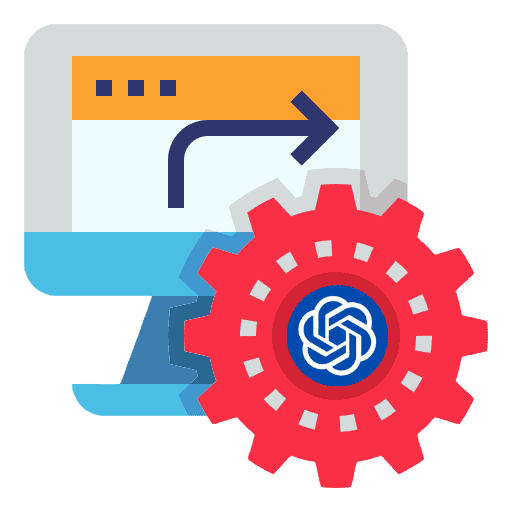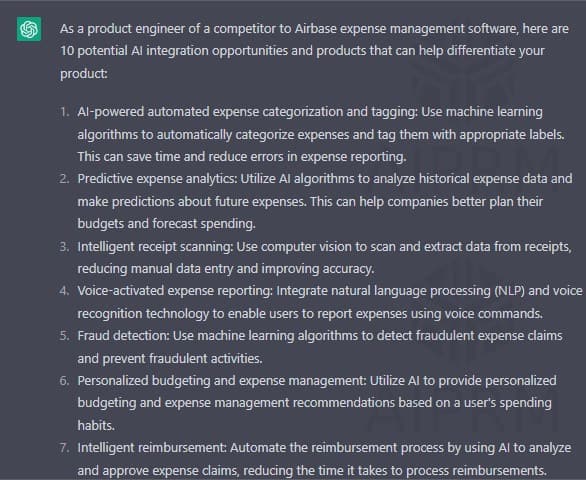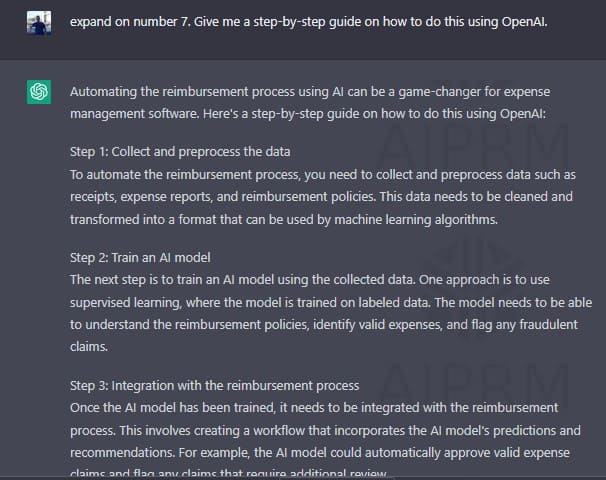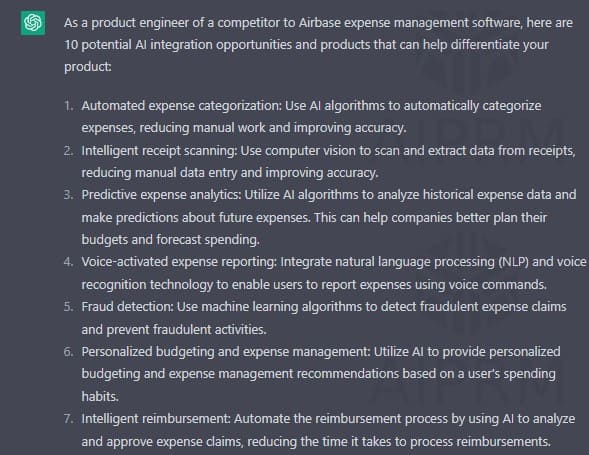Chat GPT in Business [HR, Customer Service, Retail, & More]
If you’re a business owner who’s only used ChatGPT and other AI business tools for a copy then you’re missing out on its full potential.
Creating copy for emails, blogs, audio, video scripts, and messaging is awesome but there are so many other things you can do with it.
In this article, we’ll look at some of the best Chat GPT in business use cases along with a few unique examples of how to use it in your business.
- , AI

Chat GPT in Customer Service
Chat GPT has the ability to understand and respond to customers’ inquiries with stunning accuracy and precision. But how exactly does it work, you may ask? Well, that’s where things get interesting.
Let’s take a look at a few use cases of Chat GPT in customer service.
1. Support Team Training
We all have customer service issues that we have to deal with and we often have virtual assistants responding to our customers. We give them templates to follow, but what if they didn’t need those templates? What if there was a database of the best customer service responses for pretty much anything? Well, there is, and it’s ChatGPT.
ChatGPT can handle common customer inquiries and provide helpful information, freeing up support teams to focus on more complex issues. For example, if a customer is inquiring about a product’s warranty or return policy, ChatGPT can quickly provide accurate and detailed information, allowing support teams to focus on more complex issues such as technical problems or account concerns.
Your virtual assistants can use this tool to answer customer complaints. For example, if a customer is angry and requesting a refund, your virtual assistant can use ChatGPT to write a short email explaining that there are no refunds, but we can offer a $10 store credit as a gesture of goodwill.
2. Chatbots
One of the most popular applications of Chat GPT in customer service is through the use of chatbots.
The are plenty of AI chatbots that can be integrated into websites, mobile apps, and social media channels, and can interact with customers in a conversational manner, answering frequently asked questions, and resolving simple issues.
Chat GPT-powered chatbots can also use natural language processing (NLP) to understand and respond to customer queries more accurately. In fact, NLP-powered chatbots can decrease customer support expenses by 30%, according to statistics.
One of the benefits of using a chatbot for customer service is that it allows businesses to provide quick and efficient support to customers without the need for a human representative to be available 24/7.
Chatbots can be integrated into your business website or used on messaging platforms such as Facebook Messenger or WhatsApp to provide automated customer support.
You can also integrate the chatbot with your company’s Customer Relationship Management CRM system to provide a seamless customer experience.
3. Personalization
Another way that Chat GPT can be used in customer service is to provide tailored recommendations to customers based on their needs.
You can train Chat GPT to analyze customer data and feedback to help you create customized messages that resonate with customers and encourage them to take action.
4. Automated Responses
Finally, Chat GPT can be used to automate customer service responses in your internal knowledge management software. By training Chat GPT with commonly asked questions and issues, you can create automated responses that can be sent to customers quickly and accurately.
This not only reduces response times but also frees up customer service representatives to handle more complex issues, improving overall efficiency.
Chat GPT in Marketing
Companies are always trying to level up their marketing strategies with new tech, and Chat GPT is one of the hottest tools out there right now.
Let’s dive into some of the ways Chat GPT can help businesses step up their game and get those profits rolling in.
1. Generating Content Ideas
Generating fresh content ideas is often a challenge in content marketing, but ChatGPT can be used to generate a plethora of ideas across different formats, from blog posts to social media posts. For instance, by prompting ChatGPT with a topic or industry, it can generate a range of potential article titles, video ideas, and social media post ideas.
2. Copywriting
Copywriting is another area where Chat GPT can be incredibly useful in digital marketing. Whether you need to generate ideas, create outlines, or write compelling product descriptions, Chat GPT can assist you in creating clear and concise copy that resonates with your target audience.
But Chat GPT’s usefulness doesn’t end there. It can also help improve existing content by refining it or tailoring it to a specific audience. By using Chat GPT to enhance marketing material like website content, email marketing, or even social media posts, businesses can create content that is more exciting and engaging for their audience.
3. Social Media Marketing
Speaking of social media, Chat GPT can help businesses respond to comments, answer customer inquiries, and create relevant and engaging content. Additionally, for businesses using paid channels like Google Ads or Facebook Ads, it can be used to create campaigns that target specific audiences.
4. Email Marketing
Email marketing is another area where ChatGPT can be helpful, particularly for businesses with email lists that have gone cold due to lack of regular communication. ChatGPT can create personalized and targeted email campaigns that promote products or services to a specific audience.
5. SEO
Chat GPT can even be used in search engine optimization (SEO) by performing keyword research, clustering, content optimization, backlink outreach, generating FAQs, and creating schema.
6. Market Research
Market research is a critical aspect of any successful marketing strategy. Chat GPT can assist in market research by analyzing customer feedback and providing insight into customer behavior. Chat GPT can also help businesses check out competitors and identify new opportunities in the market.
7. Lead Generation
Generating leads is one of the primary goals of marketing. Chat GPT can help businesses generate leads by providing real-time insights and alerts. By analyzing customer behavior and preferences, Chat GPT can help businesses identify potential leads and provide them with targeted marketing messages.
8. Campaign Management
In addition, chat GPT can assist in campaign management by providing instant access to relevant marketing information and resources. By automating routine tasks such as content creation, scheduling, and distribution, chat GPT can help businesses streamline their marketing efforts and increase their efficiency.
Suggested Reading:
Chat GPT in Human Resources (HR)
Let’s talk about how the HR game has been completely transformed with some next-level tech. Chat GPT can do all kinds of cool stuff like automating HR processes, enhancing the employee experience, and beefing up HR compliance.
Now, we will explore some of the most promising ways Chat GPT can transform HR functions.
1. Recruitment Automation
Recruitment is a big deal in the HR world, and automating the process can save you a ton of time and effort. By integrating chat GPT into your recruitment processes, you can automate tasks like resume screening and initial candidate communication. Chat GPT can analyze resumes and shortlist candidates based on predefined criteria, making your recruitment process more efficient and effective.
2. Employee Onboarding
Onboarding new employees can be a real hassle, but chat GPT can make things way easier. It can provide new hires with all the relevant info they need, like company policies, employee benefits, and training materials.
Plus, it can answer all their FAQs and guide them through the onboarding process. This way, chat GPT can help new employees feel more confident and engaged in their roles from day one.
3. Performance Management
Next, Chat GPT can also help HR managers with performance management by providing real-time insights and alerts. It can analyze employee data and provide performance feedback, identify areas for improvement, and suggest training programs to enhance skills.
With the help of chat GPT, HR managers can make more informed decisions about employee performance, leading to better outcomes for the organization.
4. HR Chatbot Development
Developing a conversational chatbot for HR departments is now easier than ever, thanks to Chat GPT technology. Similar to chatbots used in marketing/customer service, HR chatbots can improve the employee experience by providing instant access to information and resources.
They can also assist employees with scheduling time off, requesting benefits, filing complaints, and all that stuff. With Chat GPT, organizations can create highly personalized HR chatbots that mimic human interactions, making them more engaging and effective.
5. Employee Engagement
Keeping employees engaged is super important, and chat GPT can help out here too. It can give employees quick access to all sorts of helpful resources and answer questions they might have. This makes everyone feel more connected and helps boost employee satisfaction.
6. HR Compliance
Compliance is a big deal, but chat GPT can help keep everything in order. It can give HR folks the latest info on policies and procedures, and even keep an eye on stuff like employee training and record-keeping. With chat GPT on their side, HR peeps can stay on top of everything and avoid any legal headaches.
Chat GPT in Retail
Now we will explore how Chat GPT can be used in retail customer service to improve customer experience, personalize retail offerings, assist in inventory management, conduct market research, and even detect all sorts of fraud activities.
1. Personalized Retail Offerings
First off, let’s talk about how Chat GPT can personalize retail offerings. This thing is gonna blow your mind. It can analyze all kinds of customer data, like their browsing history and feedback, and use that info to recommend products or services that are tailored specifically to their needs.
That means happy customers and more sales for retailers. Plus, the chatbot interface makes it super easy for customers to get the personalized shopping experience they crave.
2. Real-time Inventory Management
Chat GPT can also help with real-time inventory management. It can monitor inventory levels and send alerts when stocks are running low, so retailers can avoid stockouts and keep their customers happy.
Plus, it can even analyze customer data to identify trends in product demand. That means retailers can make smarter inventory management decisions and keep the right products in stock at the right time.
3. Retail Market Research
Chat GPT can analyze customer feedback from all kinds of channels, like social media, email, and customer surveys. By analyzing this feedback, it can give retailers valuable insights into customer behavior and preferences.
That means retailers can make better decisions about product development and marketing strategies, which will keep them ahead of the competition and give customers a shopping experience they’ll love.
4. Fraud Detection
Chat GPT can also be used as a detection tool to identify fraudulent activities by analyzing large amounts of data and identifying patterns that indicate shady behaviors. This can help retailers detect fraudulent transactions quickly, preventing financial losses and protecting their reputation.
Chat GPT can analyze customer data, including purchase history and browsing behavior, to identify patterns of fraudulent activity. The tool can then alert retail managers to take action, such as flagging a transaction for review or blocking a user account.
Chat GPT in Business Examples
Now let me walk you through some of the unique ways in which Chat GPT can be used in business.
Example 1. Product Research
As I said earlier, Chat GPT can be used for market or product research. Now I’ll show you how you can do that with a little bit of prompt engineering.
Let’s pretend we are a company in the expense management space. I’m going to tell Chat GPT:
“Act as a project engineer of expense management software as a service company. I will ask questions about using AI in the industry, you’ll provide me with potential AI integration opportunities in AI products. My first request is how can AI be integrated into the expense management software industry. Give me 10 examples.”

Once it’s given me examples I can tell it to:
“expand on number 7. Give me a step-by-step guide on how to do this using OpenAI.”

Now we’ve got a general step-by-step guide on how to integrate Open AI into a potential product or new product within the industry.
Example 2. Competitor Research
How about if we want to act like a competitor?
I can go to chat GPT and I write this prompt:
“Act as a product engineer of a competitor to Airbase expense management software. I will provide you with questions on AI integration And AI opportunities, you will provide me potential AI integration opportunities and products. My first request is how can we integrate AI with our products or services to compete or differentiate from Airbase. Give me 10 examples”

Now we can use this in two different ways. If we were working for Airbase now we could have an opportunity to look at potential products other companies would use to differentiate or disrupt us.
If we were competitors to Airbase this is a good starting point to figure out how can we differentiate obviously we don’t take these suggestions exactly as is we work with our product teams to figure.
The Future of Work: Every Company Will Be an AI Company
In the future, every company will be an AI company, in the same way, that today every company is a web company. This doesn’t mean that your whole business will fundamentally be about AI, but AI will be an integral part of it, both in terms of how you operate internally and the value you provide to customers.
Today, most of us would consider it archaic to write any kind of financial reports on paper instead of in a spreadsheet or use fax instead of email. In the future, we’ll look similarly at not using AI in our workflows.
Leveraging the power of AI in these ways will reduce the time people spend on low-impact work and instead empower them to spend time on creative, strategic, or problem-solving tasks that are more valuable to the organization.
Chat GPT: Exciting Potential, Sobering Realities
But while the potential for LLMs like Chat GPT is very exciting, there are a lot of sobering realities about where they’re still limited. Current LLMs often generate texts that are untruthful or inaccurate, and can even generate harmful or biased outputs. Some of the challenges with deploying LLMs can be mitigated, but you need a thoughtful strategy. As CEO Mike Murchison wrote in an article, there are principles businesses should follow.
Maximizing the Benefits of ChatGPT and LLMs
Chat GPT is just another indication that it’s important to think about how your organization can use data to help you create a competitive advantage. Ask yourself what unique data you have that could be combined with a large language model to create something valuable. And for the areas that are less connected to your business’s IP, look for vendors who are building responsible products with LLMs that can greatly scale the efficiency of your organization.
Chat GPT in Business Wrapping Up
As AI tools like chat GPT evolve, businesses must stay up-to-date with the latest advancements. By understanding the capabilities of chat GPT and other advanced AI tools, businesses can identify new opportunities and stay ahead of the competition.
Patryk Miszczak

